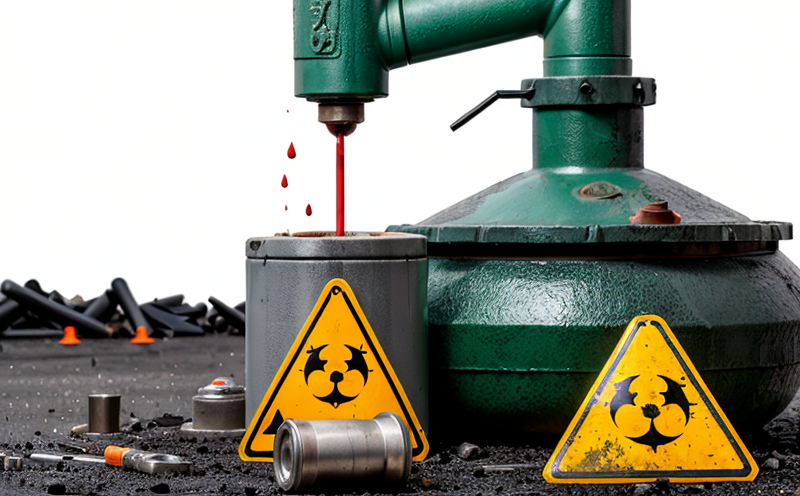Polychlorinated Biphenyl Hazardous Testing in Oils
In the realm of chemical testing, Polychlorinated Biphenyl (PCB) hazardous testing plays a critical role in ensuring environmental safety and compliance with international regulations. PCBs are a group of synthetic organic compounds that were widely used in various industrial applications until their production was phased out due to severe health and environmental risks. The focus here is on the specific service of detecting PCBs in oils, which is particularly relevant for sectors such as electrical equipment manufacturing, waste management, and renewable energy.
The testing process involves multiple steps that ensure accuracy and reliability. Initially, sample collection from the oil source must be performed under controlled conditions to prevent contamination. This step is critical because even minor exposure can lead to inaccurate results. After collection, samples are transported to our laboratory where they undergo rigorous preparation techniques including filtration, concentration, and extraction processes tailored for PCB detection.
Once prepared, the samples are analyzed using advanced analytical instruments like gas chromatography coupled with mass spectrometry (GC-MS), which provides high sensitivity and selectivity required for identifying trace amounts of PCBs. This method allows us to detect even minute quantities of these hazardous substances that could pose significant risks if not identified early.
The results are then interpreted against established standards such as those outlined in ISO 17025 and ASTM D3948-18, ensuring compliance with international best practices. Compliance is paramount when dealing with hazardous materials like PCBs since non-compliance can lead to severe legal consequences and reputational damage.
Our service extends beyond mere detection; it also encompasses risk assessment and remediation recommendations based on the findings. By providing comprehensive reports that include detailed analytical data along with actionable insights, we help clients understand not only what risks are present but also how best to mitigate them effectively.
In conclusion, PCB hazardous testing in oils is more than just a compliance exercise; it represents an investment in long-term sustainability and responsible environmental stewardship. Our expertise ensures that you receive accurate results while adhering strictly to global standards, thereby minimizing potential hazards associated with these toxic substances.
Applied Standards
| Standard | Description |
|---|---|
| ISO 17025:2017 | This international standard specifies general requirements for the competence of testing and calibration laboratories. It ensures that our laboratory operations meet stringent quality assurance criteria. |
| ASTM D3948-18 | This standard provides procedures for the analysis of polychlorinated biphenyls (PCBs) in transformer oil using gas chromatography. |
| IEC 60194:2013 | This standard covers the selection, installation and operation of oil-filled electrical equipment containing polychlorinated biphenyls (PCBs). |
| EN 75069:2018 | This European standard specifies the requirements for sampling and analysis of polychlorinated biphenyls (PCBs) in transformer oil. |
Environmental and Sustainability Contributions
The testing we offer contributes significantly to environmental protection by helping to identify and manage hazardous materials such as PCBs. By ensuring that industrial processes comply with strict regulations regarding the use, disposal, and recycling of oils containing these substances, our service plays a vital role in reducing pollution risks and promoting cleaner production practices.
Furthermore, through our work on this particular type of testing, we support broader sustainability goals by aiding organizations in making informed decisions about their operational practices. For instance, manufacturers can use our findings to upgrade or replace equipment containing PCBs with safer alternatives, thus contributing towards reducing the environmental footprint associated with such products.
Our commitment to sustainability is further reflected in our adherence to best laboratory practices which minimize waste generation and energy consumption during testing operations. This aligns closely with global initiatives aimed at fostering a more sustainable future for all sectors involved.
Competitive Advantage and Market Impact
In today’s competitive market, where compliance and safety are key factors influencing customer choice, our specialized PCB hazardous testing service offers several advantages. Firstly, it allows businesses to demonstrate their commitment to responsible environmental practices, thereby enhancing their reputation among eco-conscious consumers and stakeholders.
Secondly, by providing reliable data on the presence of PCBs in oils, we enable clients to make strategic decisions regarding equipment maintenance, replacement schedules, and overall process optimization. This can lead to cost savings through extended equipment life cycles while simultaneously reducing waste generation and associated disposal costs.
Lastly, our service helps companies stay ahead of regulatory changes by offering ongoing support for compliance with evolving standards and guidelines related to hazardous substance management. In an era characterized by rapid technological advancements and increasing awareness about environmental issues, such foresight is invaluable in maintaining competitive edge.





